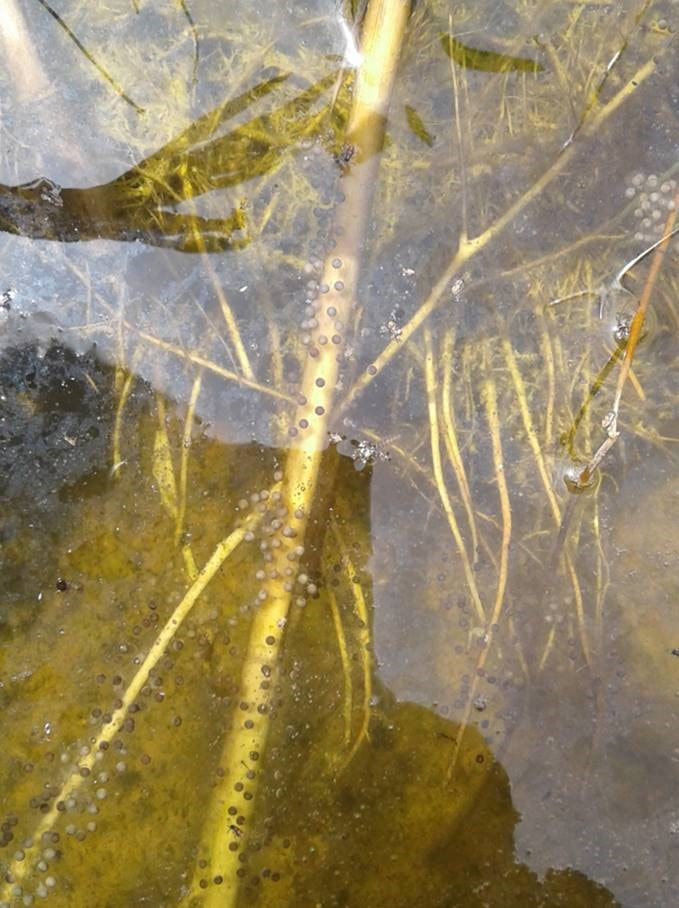|
Last year I wrote about the giant Western toad that appeared in my garden in Abiquiu last August. Without sufficient summer rains to create pools of standing water I believed that this toad couldn’t have bred. I guessed by her size that she was a female.
I watched her bury herself in the ground in earth that stayed moist. She stayed around for about a month, submerging herself during the day, setting off to hunt each hot night. I was so thrilled to have her that I was determined to build a permanent toad pond this spring to entice any amphibians in the area to move in – including that giant toad, if she returned. When I researched Western toads I learned that because of agricultural practices/engineering/river damming Western toads were considered “functionally extinct.” This phrase means that although there are still pockets of these terrestrial amphibians left, their numbers are so low that the species has no hope of long-term survival. This grim fact made me even more determined to create a home for toads. This spring with the help of my friend Andrew we sunk a wooden barrel in the ground and surrounded it with hand picked stones. It was Andrew’s idea to create a channel from the roof to the pond, so that every time it rained the little pond would fill with clear water. After we completed this project I was excited to see how efficiently it worked. Even morning dew from the roof found its way to the pond, and a light rain kept the water clear without flooding. There is something that is incredibly satisfying about putting every drop of water to good use in the desert! Now I needed some amphibians. I thought I would start with frogs. One tree frog serenaded me from the next field for a month, but even with adequate rain the spring cacophony of frog song was absent, so no breeding occurred. Andrew and I waded around looking for frogs eggs in some other wet places without success, and I reluctantly returned to Maine thinking my little pond would remain empty all summer because there just weren’t enough amphibians in the area to populate it… Here I have a number of Eastern toads living around the house. Although their numbers have also plummeted, for the moment the species is still extant, and the sounds of toad trilling sweeten each night. About a month ago I gathered some “toad-poles” down by the lake, gathered some in a pail and brought them to the house to put in a vernal pool that I had dug many years ago. It is situated next to the brook over a small seeping spring and I have raised thousands of toads and frogs over the years. It is immensely satisfying to know that although I can’t do anything to save a whole species, at least for the moment, I have a thriving population. I just wished that I could spirit some toad-poles to that small oasis in Abiquiu… Imagine my joy last week when Andrew emailed me with the news that after the first good rain in July, he noticed two toads clasped together in his home dug pool and heard them calling. The following morning he discovered strings of toad eggs attached to underwater vegetation! I already knew the story about how his toads came to him. One spring he noticed that there were tadpoles in standing water that was drying up on his property. He transported buckets of the wiggling amphibians to one pool that he kept full of water to save them from being fried by the sun. From then on Andrew had toads. In fact, I met one early this spring. “Please, oh please, take some eggs to my pond,” I begged. And he did! As of this writing all I know is that his eggs hatched almost immediately, I think in about three days. The latest update from Andrew is that he thinks the birds ate his tadpoles and maybe mine too. Oh dear. However, even if the birds got all the tadpoles perhaps a good monsoon rain will bring the adults out to mate again. I remain hopeful that by the time I return to Abiquiu, I will have a few nubbly brown croaking bug catchers hopping through the scrub around my pond.
1 Comment
andrew
8/4/2019 06:58:42 pm
Sara. great article!!
Reply
Your comment will be posted after it is approved.
Leave a Reply. |
Submit your ideas for local feature articles
Profiles Gardening Recipes Observations Birding Essays Hiking AuthorsYou! Archives
October 2025
Categories
All
|

 RSS Feed
RSS Feed